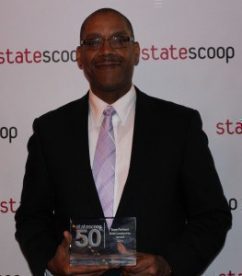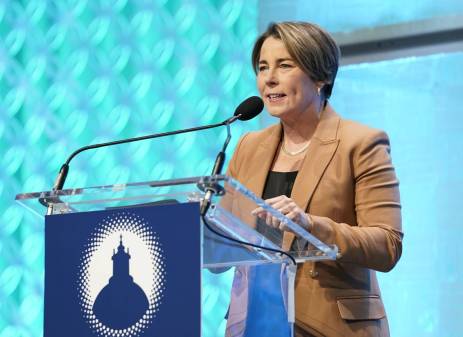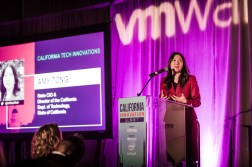Parham brings innovation to Massachusetts government

Tony Parham, Massachusetts’ government innovation officer, was one of the first chief innovation officers at the state level. Parham received the title in July 2012 after Gov. Deval Patrick created the position earlier that year.
Innovation has been a hallmark of Patrick’s administration — in the state’s economy as a whole and in the operation of the state government itself. The mission of the GIO is to make government agencies more-efficient and -effective through use of new technologies and innovative processes.
With a state government of 67,000 employees spread across 151 agencies, Parham has ample opportunity to nurture initiatives started within the government’s own walls and also bring in outstanding ideas from external organizations.
“The role of the innovation officer is still new in a lot of ways to government, although it’s taken root in the private sector,” Parham said. “Governor Patrick invests in innovation in the Massachusetts economy because he believes in enabling and encouraging industries, which are using their brainpower to help shape our future. Similarly, in my GIO role, I’m always looking to unearth new approaches and to find value in creative ideas. This position creates someone in government who can take some of these ideas, validate them and champion them for the greater good.”
One of Parham’s current projects, the Commonwealth of Massachusetts Innovation Fellows program, was inspired by the Presidential Innovation Fellowship program, which was created by Todd Park, President Obama’s chief technology officer. The CMIF program, headed by Parham, is actively bringing technologists, entrepreneurs and innovators into government to address specific opportunities.
Although the CMIF program is still in its early stages, Parham already has five fellows working with Massachusetts on five different topics:
- Information technology procurement reform — Streamlining technology procurement into a quick and more effective process, while broadening the variety of contractors working with the commonwealth to include more small, innovative firms.
- Improve the user experience for various state websites and processes.
- Utilization of open data — Identifying key citizen focus areas to learn what types of data sets should be “liberated” (while, of course, ensuring that all privacy issues are handled appropriately). On May 28, Massachusetts will host the Mass EduData challenge with hack/reduce, a nonprofit created in partnership with the MassTech Collaborative. At the Mass EduData Challenge, developers and data professionals will create web and mobile applications that make various public aspects of education data more readily usable by parents and other constituents.
- Digital video content shared services: Parham is working to leverage a small, internal video studio as an enterprise-wide resource that can be used to enhance digital communications across all of the commonwealth’s agencies.
- Recidivism: By analyzing key data sets gathered over the years, policy changes can be recommended and implemented, which improve how a variety of state agencies address this important topic.
In addition to the above topics, Parham is actively seeking talented candidates to lead a few other programs, such as a project that targets the creation of a portfolio of software-as-a-service education tools, which can be provided to a number of Massachusetts’ 351 municipalities.
Another project Parham is leading as GIO is the utilization of Massachusetts’ iCatalyst platform, a web-based crowd-sourcing tool that allows audiences to provide input into various challenges. Parham said the commonwealth currently has a pipeline of about 30 iCatalyst projects in various stages of evaluation an implementation, with more projects constantly being added.
“We’ve been able to get some good wins so far,” Parham said. “When I first came in, I dialogued with the various agencies to identify areas where innovation could quickly make things better. Now we want to build on that progress we’ve made.”
Before his appointment, Parham had a long, successful career in the private sector, serving as an executive for a number of notable organizations, including CrossTech Ventures, IBM and Lotus Development Corporation.
As the commonwealth’s innovation officer, Parham is part of a small but growing national trend. When he joined state government nearly two years ago, only one other state — Maryland — had an innovation officer in place. Since then, other states around the country have slowly added them. But there are still less than a dozen across the country (Although Parham pointed out that there are numerous states where innovation and best practice initiatives are driven by CIO’s and other personnel).
One thing he’s done is lean on the richness of his area of the country. Being based in Boston, Parham sits in one of the country’s more dynamic technology environments, which includes both a growing entrepreneurial environment and top-tier universities such as Harvard and the Massachusetts Institute of Technology, where Parham holds two degrees.
To share and learn ideas, he also attends a standing quarterly meeting in Boston of corporate chief innovation officers that was co-founded by a member of the Governor’s Council for Innovation, an advisory board for Patrick and the GIO.
One thing Parham said he would like to do is find ways to further increase interaction between the state government and the surrounding technological might. Governor Patrick’s ability to identify opportunities to accelerate Massachusetts’ innovation economy is part of the reason why Massachusetts has earned the top spot for economic competitiveness and also why it is a global leader in the innovation sector.
“We are at the very beginning of the process of leveraging the region’s technology prowess in state government itself, but there is great potential there to bring more ideas into government,” Parham said.






